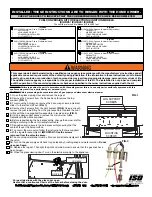
19
Oxford Direct Vent / Natural Vent Gas Heater
30005123
8. Install appropriate pipe sections until the vent run
reaches above the flashing. The enlarged ends of the
vent sections always face downward.
9. Install the storm collar and seal around the joints. (Fig.
31)
10. Add additional vent lengths to achieve the proper
overall height.
11. Apply cement to the inner and outer termination col-
lars and install the terminal cap.
ST222
vent thru ceiling
12/99
#7DVAIS
Attic
Insulation
Shield
#7DVFS
Firestop
In Upper
Floor
#7DVFS
Firestop in
Ceiling
Use Four 8d
Nails
ST222
Fig. 30
Install firestops and attic insulation shield.
ST221
vent thru roof
12/99
Storm Collar
Sealant
Upper
edge of
flange goes
under upper
shingles
Flashing
#7DVSKV
(A, B of F)
Roof Support
ST221
Fig. 31
Roof support and flashing.
Venting System Assembly - Natural Vent
General Information
The heater is shipped from the factory as a Direct Vent
Heater. It may be converted to a Natural Vent heater by
installing the Model FSDHAG Draft Hood Adapter.
The heater is approved for installation as a Natural Vent.
Vermont Castings Group Direct Vent pipe could be used
directly after the Draft Hood Adapter up to the ceiling,
then B-vent pipe must be used. Do not mix types of B-
vent pipe; use components from one maker or the other.
Follow the vent component maker’s instructions exactly.
The heater will also accept standard or enamelled 7” (150
mm) diameter pipe, around the Type B venting, for deco-
rative purposes only. (Fig. 32)
NOTE: The restrictor plate supplied with the stove is
not used for Natural Vent applications.
ST358
DW
Decorative
pipe around b-vent
5/15/03 djt
Decorative 7”
Pipe
4” B-vent
Pipe
Draft Hood
Adapter
Vermont Castings
Group Direct Vent
System may be
used Draft Hood up
up to the ceiling
ST766
Fig. 32
Decorative 7” pipe may be fitted around the B-vent
pipe.
The stove, when installed as a Natural vent heater, in-
cludes a vent safety switch. (Fig. 63, Page 32) Operating
the stove when it is not connected to a properly installed
and maintained venting system, or tampering with or dis-
connecting the vent safety switch, can result in carbon
monoxide (CO) poisoning and possible death.
For U.S. installations:
The venting system must conform
with local codes and/or the current National Fuel Gas
Code, ANSI Z22.1.
For canadian installations:
The venting system must
conform to the current CSA B149.1 installation code.
Install the Vent pipe
Apply a bead of sealant around bottom end of inner start-
er pipe (found in bag with logset) and attach to stove. Ap-
ply a bead of sealant around top of inner starter pipe and
install the FSDHAG Draft Hood according to Draft Hood
instructions. (Fig. 33)
















































